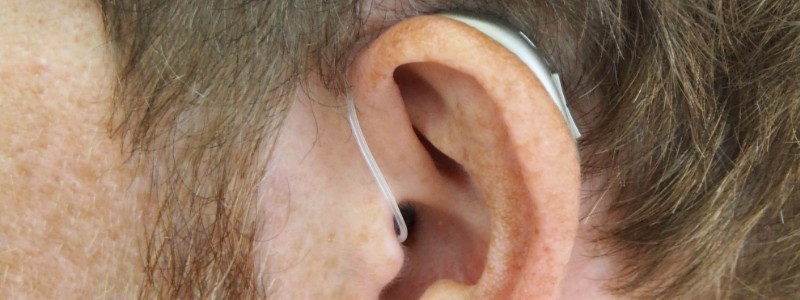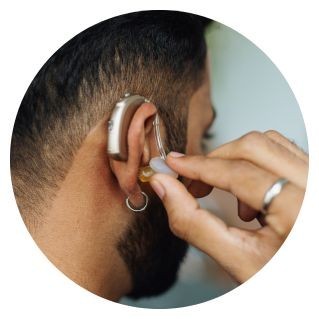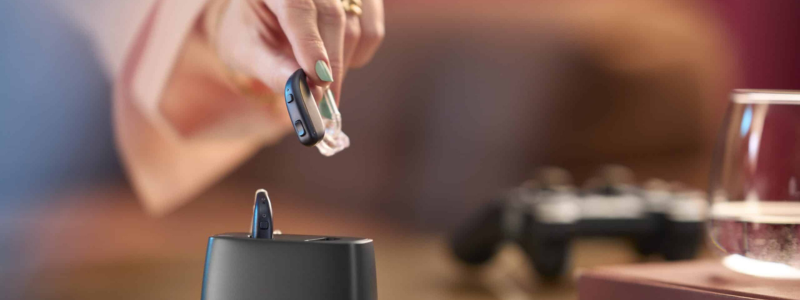
Head of Online Medical Content

Audiology Expert

Why Does My Hearing Aid Whistle?
How to prevent any sound leakage from your hearing aids and how to fix any feedback issues
Overview | How can you make the whistling stop? | What to do if the whistling continues | Prevention and conclusion/a>
Last Hearing Aid UK Update:
Whistling hearing aids
Hearing aids may whistle due to feedback, which occurs when amplified sound escapes from the ear canal and re-enters the microphone.
This can be caused by improper fit, earwax buildup, or a high-volume setting. Proper fitting, regular cleaning, and adjusting the devices can help minimise this whistling sound.
In this article, we look at the common causes of whistling in hearing aids, ranging from poor fit to earwax blockages. We also explore solutions and technologies that aim to eliminate the feedback and discuss tips for wearers to reduce whistling.
Why is my hearing aid producing a whistling sound?
Hearing aids offer a bridge to the world of sound for millions. Whilst designed to improve the quality of life for those with hearing loss, they can still introduce an unwelcome disturbance into the listening experience. The enigmatic whistle, for example.
High-pitched feedback sounds, such as a whistle, can be not only bothersome but also uncomfortable. In this modern world, we now rely on seamless communication more than ever. Annoyances, such as whistling, highlight the urgent need for new innovative solutions.
Hearing aid whistling can be common
Those who wear hearing aids sometimes complain about whistling noises coming from their devices and the inconvenience they bring.
Because of the nature of hearing aids, feedback can occur, which creates a high-pitched sound that can be unbearable to listen to for long periods.
Hearing aids are simply miniature marvels of engineering, comprising microphones, amplifiers, and receivers. However, the intricate nature of these components means they can create a feedback loop.
This is when sound from the receiver is re-amplified by the microphone, leading to the whistling.
Other factors could be an improper fit, occlusion, or excessive earwax. There is generally a root cause for whistling hearing aids, and such problems can be easily fixed.

How do I stop my hearing aid from whistling?
Experiencing a whistling sound from your hearing aid can be both irritating and potentially embarrassing when it's audible to those around you. The good news is that there are typically steps you can take to address this issue.
Commonly, a hearing aid produces whistling or squeaking sounds when the ear mould is not correctly positioned. To prevent any sound leakage and, subsequently, the whistling, make sure the ear mould fits snugly within your ear.
If you're still encountering feedback, consider the following tips to mitigate this bothersome whistling:
Earwax build-up
Keep your ears clean. Earwax build-up in the ear canal can block sound transmission, causing it to be forced back out (feedback loop) and thus creating a whistle.
You can attempt to resolve this by applying a few drops of olive oil to your ear in the morning and at night for five consecutive days.
If there's no improvement, consult your local GP, who may prescribe ear drops or recommend an ear syringing procedure to safely remove any stubborn wax. Leaving this problem to continue will change how you perceive sound, and this can have problematic consequences.
It is also important to ensure that there is no earwax left on your hearing aid's earpiece, as the problem can arise again.
Related reading: All you need to know about earwax
Keep an eye on the hearing aid volume
Reduce the volume of your hearing aids to a comfortable level that still allows you to hear clearly. Wearing your hearing aids at maximum volume may lead to unwanted noise.
If you find yourself needing the highest volume setting to hear properly, your hearing might have changed. It's advisable to consult your audiologist to assess your hearing, verify the proper functioning of your hearing aid, or make adjustments to rectify the problem.
Consider proximity
Why does my hearing aid whistle when I touch it? Try to avoid covering or touching your hearing aids. Proximity to certain objects can cause some hearing aids to whistle.
This is one of the reasons why audiologists often conduct tests by moving their hand close to the hearing aid to check for feedback. If this continues to occur, discuss the issue with your audiologist.
You may have noticed that hugging people on the side with the hearing aid can lead to feedback, so consider directing friends and family to the side without the hearing aid, if applicable, to reduce feedback.
Be mindful when wearing headgear
Wearing a hat covers your hearing aids, which can result in whistling. This is because the hat's fabric can obstruct the hearing aid's microphone or receiver. This interference disrupts the hearing aid's functionality, causing feedback.
To prevent whistling while wearing hats or other headgear, consider hat styles that allow adequate space around your hearing aids or use accessories like hearing aid retention clips. You can also try reducing the volume of your devices or removing the hat completely.
Eating can cause feedback
Why does my hearing aid whistle when I eat? Jaw movements such as chewing or smiling can cause feedback. Hearing aids may whistle while eating due to changes in the shape of the ear canal caused by jaw movement.
This movement can temporarily affect the seal between the ear canal and the hearing aid, creating feedback. It's a common occurrence, but ensuring a snug fit and seeking professional adjustments can help mitigate the issue.
A change in body shape can cause whistling
Be aware that changes in your weight, either gain or loss, can lead to an improper fit, causing the hearing aid to produce a whistling sound. Consult your audiologist to obtain a new or modified ear mould.
Old hearing aid parts can cause issues
The plastic tube that connects some hearing aids to the ear mould can harden and shrink over time, pulling it out of its correct position and causing whistling. If the tubing or ear moulds are loose or damaged, they may need adjusting or replacing by your audiologist.
The fit needs to be right
Make sure the earpiece and ear mould are correctly positioned and snug within your ear. Whistling may also occur when inserting the hearing aid if there's an imperfect fit between the earpiece and the ear.
Modern hearing aids typically incorporate a brief delay between closing the battery case (which activates the device) and the electronics starting up.
Quickly placing the hearing aid in your ear can often prevent the whistling. You can try turning on the hearing aid (closing the battery case) once it's properly positioned, although this might be more challenging for those with longer hair.
You could also consider an open-fit hearing aid. Open-fit hearing aids, which allow some natural sound to enter the ear, can be a solution for some wearers as they are less prone to whistling.

Why your hearing aid may have started whistling
How to avoid your hearing aids from whistling in the future
What to do if your hearing aids are still whistling
In noisy environments, hearing aids can sometimes struggle to differentiate between the desired sound and background noise, leading to feedback. Use the feedback cancellation features available to you.
Many modern hearing aids come with feedback cancellation algorithms and adaptive signal processing techniques that can automatically detect and eliminate whistling.
Artificial intelligence continues to hold promise for real-time monitoring and adjustment, preempting feedback whilst maximising sound quality and comfort, which also tackles feedback issues.
However, for a quick fix, adjust your hearing aid settings to minimise background noise by accessing any Background Noise Cancellation features available to you. Your audiologist can also fine-tune your hearing aids to reduce feedback with your hearing loss in mind.
Ensuring you remain consistent with regular check-ups and future hearing healthcare treatment plans will also bring to light any device issues early, making sure you always hear at your best.
Talk to your audiologist about IIC hearing aids and upgrading
If you're still struggling with feedback and don't already have an Invisible in Canal (IIC) hearing aid, consider exploring this option.
IIC hearing aids can effectively eliminate feedback whistling, using digital technology to enhance sound quality and custom-fitting entirely within your ear canal.
For instance, most IIC hearing aids offer features like feedback suppression and wind noise reduction for outdoor clarity, as well as a music mode for clearer musical notes without feedback or distortion.
Often, hearing aids can become troublesome, and the components can start to malfunction through wear and tear when they are reaching the end of their lifespan.
This might be a sign to think about upgrading your existing devices to more current technology. Discuss your concerns and other hearing aid options available with your audiologist.
Related reading: All about IIC hearing aids
Key takeaways
- Whistling (feedback) occurs when amplified sound escapes and re-enters the microphone
- Most common cause is poor fit - ensure ear mould is snug and positioned correctly
- Clean earwax regularly from both your ears and the hearing aid
- Reduce volume if too high and avoid covering/touching the device
- Hats, headgear, and jaw movements (eating/talking) can cause temporary whistling
- See your audiologist if whistling persists, tubing is loose/damaged, or you need maximum volume to hear
- Modern hearing aids have automatic feedback cancellation features
- Regular check-ups and proper maintenance prevent future issues
Conclusion
In today's age of advanced technology, most modern hearing aids come equipped with automatic feedback cancellation features. However, whistling issues can still arise.
Begin by ensuring your hearing aids are free from potential obstructions, such as hats, scarves, or earmuffs. Also, be cautious not to wear them while sleeping, as this could inadvertently trap sound within the receiver, creating a feedback loop.
Keep the hearing aid or earmould securely positioned in your ear to prevent feedback. If your device has volume control, it's advisable to maintain it close to the default setting. Ensure you stick to regular ear check-ups.
These are important to detect and address earwax buildup, which can harm your hearing aids and trigger the troublesome whistling noise.
Whistling hearing aids can be incredibly vexing, but with these precautions, you can minimise the issue. If problems persist, seek guidance from an audiologist or your local GP to effectively eliminate hearing aid whistling. Do not let the feedback problem persist any longer.
Why Choose Us?
- FREE Hearing Tests
- Best Hearing Aids and Prices
- FREE Aftercare for Life
- FREE Home Visits
- 200+ Local Audiologists
- 60 Day Money Back Guarantee
Why does my hearing aid whistle?
If you continue to experience whistling despite these efforts, consider discussing feedback reduction technologies and more advanced hearing aid models with your audiologist.
Remember that each person's experience with hearing aids may be unique, and the causes of whistling can vary.
Consulting with your audiologist is essential to pinpoint and address the specific issues leading to feedback and to find the most effective solutions tailored to your needs.
You can download the NHS whitepaper on ear health as a useful reference below.
Other hearing aid technology articles you might like...
 Parts of a hearing aid
Parts of a hearing aid  What hearing aid features do I actually need?
What hearing aid features do I actually need?  Speech enhancement in hearing aids
Speech enhancement in hearing aids Our specialist service includes:
Do not spend hundreds of pounds without getting a second opinion from us.
Please call us on 0800 567 7621
 Not only are the prices great, but the service is fantastic! Many thanks to your team.
Not only are the prices great, but the service is fantastic! Many thanks to your team.What's included in our hearing aid prices?
Common FAQs about whistling hearing aids
How do I stop my hearing aid from whistling?
Begin by ensuring the device is undamaged and free from earwax buildup. Then, attempt to position the receiver deeper into your ear, as loose placement can cause hearing aids to whistle. If these measures prove ineffective, it's essential to consult a hearing health professional for adjustments.
What does a whistling sound in a hearing aid mean?
Excessive volume settings on your device can lead to the sound being redirected back into your hearing aids, resulting in whistling. Earwax buildup can block the ear canal, preventing sound from passing through and causing feedback as it reflects back into the device.
How to stop hearing aids from squealing?
If you're using a custom hearing aid, gently press your finger on it or on the ear mould in your ear and push it slightly deeper. If this temporarily stops the squealing, your hearing aid or ear mould may be too loose. A snug fit is crucial to prevent squealing in hearing aids.
Other pages you might find useful
Ask the Experts
6 Morton Lane
Walkwood
Redditch
Worcestershire
B97 5QA
Latest Launch
When we refer to a product as 'Latest Launch', we mean it is the latest to be released on the market.
New
When we refer to a product as 'New', we mean that the product is the newest hearing aid model on the market.
When we refer to a product as 'Superseded', we mean that there is a newer range available which replaces and improves on this product.
Older Model
When we refer to a product as an 'Older Model', we mean that it is has been superseded by at least two more recent hearing aid ranges.
